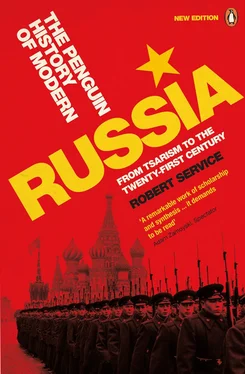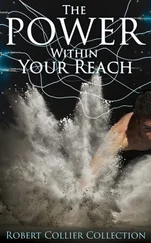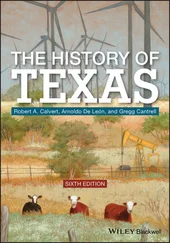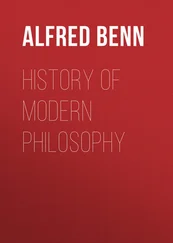Pasternak, Boris, 139, 248, 316, 365; Doctor Zhivago , 365
Patolichev, Nikolai, 278
patriotism, 288–90, 321–2
patronage, 539
Patrushev, Nikolai, 545
Paulus, Field Marshal Friedrich, 266
Pavlov, General D.G., 260, 265
Pavlov, Ivan, 8, 248, 573
Pavlov, Valentin, 493–4, 496, 499
Peace, Decree of (Lenin’s), 68
peaceful co-existence, 399
Pearl Harbor, 268
peasants: and farm technology, 5; and land tenure, 5–6, 22, 34, 39–41, 55–6, 67–8, 86; traditionalism, 5–6, 22, 90, 130, 147; emancipation (1861), 6, 71; and industrial workers, 8–9; migrant and seasonal labourers, 8; unrest, 13, 119–20, 122, 124, 127, 183; and 1905 revolution, 14–15; representation in Duma, 15–16; Socialist Revolutionaries and, 19–20; in World War I, 28, 31; demand increased prices for produce, 52, 90; act against gentry landlords, 55–6; in army unrest, 56–7; self-government, 60, 90; direct action by, 69, 86; learn of October Revolution, 73; refuse to sell grain, 79; and land nationalization, 82; servicemen demobilized (1918), 86–7; middle ( serednyaki ), 90–91; grain hoarding, 109–10, 163–4, 174; conscription of, 120; and tax-in-kind, 124–5; and NEP, 126; religious observance, 135, 204; coercion against, 146; standard of living, 146–7; and United Opposition, 160; and forced collectivization, 179–84; imprisoned, 179; Stalin’s attitude to, 182–3; in Ukraine, 202; private plots and marketing, 243, 284, 298–9, 351, 402, 516; migrate to towns and cities, 245–6, 328, 421; behaviour and manners, 246; World War II conditions, 286; post-World War II taxation, 304; under Khrushchëv, 358–9; and Gorbachëv’s reforms, 470–71; see also agriculture; collectivization; kolkhozes; kulaki
Pelevin, Viktor, 543
penal policy, 382; see also criminality and criminal gangs; Gulag pensions, 357, 541
Penza province, 39, 108
People’s Commissariat of Enlightenment, 95, 132
People’s Commissariat of Food Supplies, 109
People’s Commissariat of Internal Affairs, 97
People’s Commissariat for Nationalities ( Narkomnats ), 113, 116, 131
People’s Commissariats, 211, 216, 323
People’s Will (party), 18
perestroika (reconstruction), 441–2, 444, 464, 466, 480, 485, 488, 490
Perle, Richard, 444
Pershing missiles, 400
Persia see Iran
Peter I (the Great), Tsar, 4, 206, 226, 371, 512
Petrakov, Nikolai, 493
Petrograd see St Petersburg
Petrograd Society of Factory and Works Owners, 39
Petrovorets, 296
Pikhoya, Lyudmila, 511
Piłsudski, Józef, 120
Pimen, Patriarch, 476
Platform of the Forty-Six, 156
Platonov, S.F., 200
Plzeň (Czechoslovakia), 336
Podgorny, Nikolai, 236, 373, 378, 384, 388, 403
Pokrovski, M.N., 206
Poland: 1867 revolt, 12; 1905 unrest, 13; pre-World War I discontent, 23; offered independence (1917), 69; 1920 war with Russia, 120–1, 141; wins provinces, 128; right-wing dictatorship, 171; deportations to Kazakhstan, 225; Communist Party purged, 231; 1939 invasion of, 256–7; and Russian advance in World War II, 267–8; officers murdered, 268; post-World War II settlement, 270–71, 306–7; and formation of Cominform, 308; collectivization in, 311; unrest in, 336, 342, 344; economic expansion, 386; workers’ opposition develops, 409, 411; affected by Chernobyl disaster, 445; communism collapses in (1989), 483; economic recovery, 519; joins NATO 537; relations with Russia, 537, 556, 561, 562
police: venality, 519
Politburo: introduced, 111–12; and local disputes, 119; and NEP, 124–5, 143–4, 156, 162–3; crushes strikes, 127, 143–4; and republics and nationalities, 129–30; suppresses class enemies, 137; encourages education, 142; power control in, 151–2, 211–12, 216; and Lenin’s death, 153; criticized by Platform of the Forty-Six, 156; and economic recovery, 159–60, 162, 217; Trotski criticizes, 159; and industrial planning, 160, 178; and Stalin’s grain procurement, 172–3; agrarian policy, 179–81; and national security, 187; and living standards, 193; authority and jurisdiction, 208; sanctions violence, 211; meetings reduced, 219; Stalin undermines power, 220; and Great Terror, 221; Stalin reduces meetings, 232, 339; privileges, 320–21; redesignated Presidium, 327; silence on Stalin’s policies, 330; and Eastern Europe, 385–7; name restored, 385; and foreign policy, 388–90; and non-Russian nationalism, 390, 423–4; stabilizes policies (1960s), 392; resolution on agricultural production (1976), 402; age of members, 404–5, 439; on developed socialism, 405–6; economic reforms, 408–9; abolishes educational discrimination, 410; sanctions invasion of Afghanistan, 411; and dissenters, 413–15; and material improvements, 417; and control of people, 420; and Andropov’s reforms, 431; and appointment of Gorbachëv as Chernenko’s successor, 435; Gorbachëv’s appointments to, 438–9, 486; relations with Gorbachëv, 443, 446–7; and Gorbachëv’s reforms, 451, 463, 485; ethnic composition, 456, 478; and economic crisis (1980s), 470; powers reduced at 28th Party Congress, 490
Politkovskaya, Anna, 556
pollution see environment
Polozkov, Ivan, 488–9, 494–5
Polyanski, Dmitri, 390, 403
Pomerantsev, Vladimir, 335
Ponomarëv, B.N., 360
Popkov, Matvei D., 148
Popov, Gavril, 475, 520
Popov, Nikolai, 198
popular fronts, 230
Portsmouth, Treaty of (1906), 3
Portugal: African empire collapses, 399
Poskrëbyshev, A.N., 219, 324
Pospelov, P.N., 237, 337
Postyshev, Pëtr, 213, 220, 242
Potsdam conference (1945), 273, 306
poverty, 7–9, 180–2, 249, 541
Powers, Gary, 353
Prague: Gorbachëv visits, 463–4
‘Prague Spring’ (1968), 386–7
Pravda (newspaper): circulation, 72; Trotski writes in, 105; Party propaganda in, 140; and NEP, 172; sale price, 191; Stalin edits, 196; in countryside, 200; local investigations, 244; on espionage threat, 249; attacks Tito, 310; on agricultural problems, 320; on post-Stalin reforms, 332; 1962 debate on economic reform, 372; and Khrushchëv’s successors, 378; postpones announcement of Kosygin’s death, 403; and static official policy, 409; on Gorbachëv, 440; reports Yeltsin’s drunkenness, 489
Pre-Parliament (Provisional Council of the Russian Republic), 58
Preobrazhenski, Yevgeni, 153, 156–7, 161–2; The ABC of Communism (with Bukharin), 142
Presidium: Bureau of the, 327; under Khrushchëv, 344–5
press: circulation, 191; and glasnost , 449; under Yeltsin, 538, 549
Press, Decree of (Lenin’s, 1917), 69, 94–5
prices: and taxation, 163; agricultural, 164, 172, 363–4; post-World War II, 299; kept low, 410; rises under Gorbachëv, 492, 495; liberalization under Yeltsin, 509–10, 513, 525; see also inflation
priests and clerics: denied civic rights, 89, 136; persecuted, 203–4, 282, 298, 382; see also Orthodox Church; religion
Primakov, Yevgeni, 530, 547
Princip, Gavrilo, 25
prisoners of war: Soviet, 264, 277, 280, 298, 300–301; German, 353
prisons see Gulag
private plots see peasants
privatization, 80, 515, 525–6, 531, 534, 541–2
privileges and benefits, 237, 244, 314, 320–21, 371, 410, 421
Prokhanov, Alexander, 497
Proletarian Culture ( Proletkult ), 88
Provisional Council of the Russian Republic see Pre-Parliament
Provisional Government (1917): formed, 26, 33–4; ineffectiveness, 36; appoints commissars, 40; and nationalities’ demands, 40–41; and regional reorganization, 45, 49; alliance with socialists, 46; Lenin opposes, 47–8; Kerenski leads, 50–51; Petrograd demonstrations against, 50; and conduct of World War I, 53; and social disruption, 55; second and third coalitions, 57; unpopularity, 58, 60; overthrown in October Revolution, 62; and foreign loans, 163
Читать дальше












